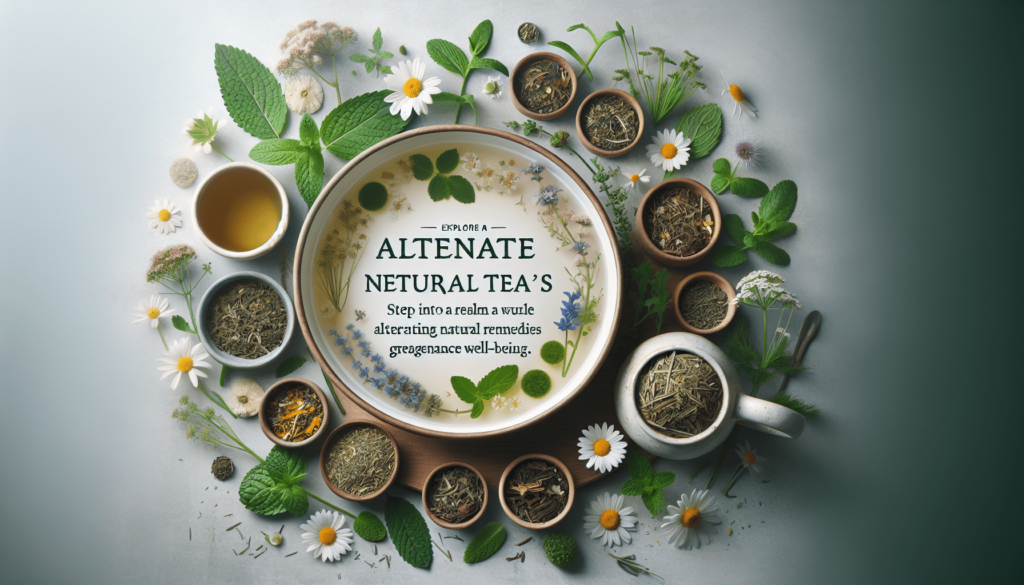Are you looking for a natural and delicious way to boost your health and overall well-being? Look no further than herbal teas! Packed with beneficial properties, herbal teas have been used for centuries to promote relaxation, improve digestion, boost immunity, and even aid in weight loss. In this article, we will explore the wide range of herbal teas available and discover the myriad of health benefits they offer. Whether you’re a tea aficionado or just starting to venture into the world of herbal teas, get ready to embark on a journey to better health with these amazing brews.
Benefits of Herbal Teas
Herbal teas have been used for centuries to promote health and wellness. They offer a wide range of benefits, making them a popular choice for those looking for natural remedies. From boosting the immune system to reducing inflammation, here are some of the key advantages of incorporating herbal teas into your daily routine.
Boosts the immune system
One of the major benefits of herbal teas is their ability to boost the immune system. Certain herbs, such as echinacea and elderberry, contain compounds that can strengthen your body’s defense mechanisms. Regular consumption of immune-boosting herbal teas can help prevent common illnesses and keep you feeling healthy and strong.
Aids in digestion
If you often experience digestive issues like bloating or indigestion, herbal teas can provide relief. Peppermint tea, for example, has been used for centuries to soothe the stomach and relieve gastrointestinal discomfort. Other herbs like chamomile and fennel can also help promote healthy digestion and prevent digestive problems.
Calms the mind
In our fast-paced and stressful lives, finding ways to relax and unwind is essential. Herbal teas like chamomile and lavender have natural calming properties that can help reduce anxiety and promote relaxation. By incorporating these teas into your daily routine, you can create a peaceful moment for yourself and enjoy a sense of tranquility.
Promotes detoxification
Herbal teas can also aid in the detoxification process by promoting healthy liver function and supporting the body’s natural cleansing mechanisms. Dandelion tea, for example, is known for its detoxifying properties and has been used in traditional medicine to cleanse the liver and kidneys. Regular consumption of herbal teas can help remove toxins from your body and support overall well-being.
Reduces inflammation
Inflammation is the body’s natural response to injury or infection, but chronic inflammation can lead to various health issues. Many herbal teas, such as ginger and nettle tea, have anti-inflammatory properties that can help reduce inflammation in the body. By incorporating these teas into your routine, you can support a healthy inflammatory response and potentially reduce the risk of chronic diseases.
Popular Herbal Teas
When it comes to herbal teas, there are countless options to choose from. Here are some of the most popular herbal teas and their unique benefits:
Chamomile tea
Chamomile tea is well-known for its calming and soothing properties. It can help promote relaxation, relieve anxiety, and improve sleep quality. Chamomile tea is also commonly used to soothe digestive issues and ease menstrual cramps.
Peppermint tea
Peppermint tea is a refreshing and invigorating herbal tea that can help soothe digestive discomfort, relieve headaches, and improve mental clarity. It has a cooling effect on the body and can be enjoyed both hot and cold.
Ginger tea
Ginger tea is a popular choice for its warming and comforting effects. It can help soothe an upset stomach, reduce nausea, and relieve menstrual pain. Ginger tea is also known for its anti-inflammatory properties and can support overall immune health.
Lemon balm tea
Lemon balm tea has a pleasant citrus flavor and offers a range of benefits. It can help reduce anxiety and promote relaxation. Lemon balm tea is also believed to have antiviral properties and can support a healthy immune system.
Nettle tea
Nettle tea is a nutrient-rich herbal tea that can support overall health and well-being. It is known for its detoxifying properties, as well as its ability to reduce inflammation and relieve allergy symptoms. Nettle tea is also a good source of vitamins and minerals.

Choosing and Preparing Herbal Teas
To fully enjoy the benefits of herbal teas, it’s important to choose high-quality herbs and prepare them correctly. Here are some tips to help you select and prepare herbal teas:
Selecting high-quality herbs
When purchasing herbal teas, opt for organic and sustainably sourced herbs whenever possible. Look for reputable brands that prioritize the quality and purity of their products. This ensures that you’re getting the most potent and beneficial herbs in your tea.
Using the right water temperature
Different herbs require different water temperatures for optimal extraction. As a general rule, delicate herbs like chamomile and lavender should be steeped in water that has been brought to a slight boil, while heartier herbs like ginger and nettle can withstand higher temperatures. Follow the recommended steeping instructions for each herbal tea to get the best results.
Steeping time and techniques
The duration of steeping can greatly impact the flavor and potency of your herbal tea. Some teas, like chamomile, require a longer steeping time of around 5-10 minutes to bring out their full flavor. Others, like peppermint, can become bitter if steeped for too long. Experiment with different steeping times to find your preferred strength.
Adding sweeteners and flavorings
While herbal teas can be enjoyed on their own, you can also enhance their taste by adding natural sweeteners like honey or stevia. Additionally, you can infuse your herbal teas with citrus slices, herbs like mint or basil, or even spices like cinnamon or cardamom to create unique flavor combinations.
Specific Herbal Teas for Common Ailments
Herbal teas have long been used as natural remedies for common ailments. Here are some specific herbal teas that can help alleviate certain health issues:
Sore throat: Licorice root tea
Licorice root tea has antibacterial and antiviral properties that can help soothe a sore throat and reduce inflammation. It can also provide relief from coughing and promote respiratory health.
Insomnia: Valerian root tea
Valerian root tea is a popular choice for those struggling with insomnia or difficulty falling asleep. It has gentle sedative properties and can promote relaxation and a restful night’s sleep.
Nausea: Ginger tea
Ginger tea is particularly effective in relieving nausea caused by motion sickness, morning sickness during pregnancy, or digestive disturbances. It can help calm the stomach and reduce feelings of queasiness.
Headache: Peppermint tea
Peppermint tea is known for its ability to relieve headaches and migraines. It has a cooling effect and can help relax tense muscles, alleviating the pain associated with headaches.
Stress and anxiety: Lavender tea
Lavender tea has a calming and soothing effect on the mind and body, making it an excellent choice for reducing stress and anxiety. It can promote relaxation and improve overall mood.

Herbal Teas for Weight Loss
In addition to their various health benefits, certain herbal teas can also support weight loss efforts. Here are some herbal teas that are often recommended for weight loss:
Green tea
Green tea is well-known for its metabolism-boosting properties. It contains catechins, a type of antioxidant that can enhance fat burning and aid in weight management. Green tea can also help suppress appetite and increase energy expenditure.
Dandelion tea
Dandelion tea has diuretic properties that can support water weight loss. It helps flush out excess fluid from the body, reducing bloating and promoting a leaner appearance. Dandelion tea can also aid in digestion and support liver function.
Yerba mate tea
Yerba mate tea is a traditional South American herbal tea that is often consumed for its energizing effects. It can help increase metabolism, burn fat, and suppress appetite. Yerba mate tea also provides a natural boost of energy without the jitters associated with caffeine.
Fennel tea
Fennel tea can aid in weight loss by reducing cravings and promoting a feeling of fullness. It has natural appetite suppressant properties and can also support healthy digestion.
Rosehip tea
Rosehip tea is rich in antioxidants and can aid in weight loss by boosting metabolism and promoting fat oxidation. It can also help cleanse the body of toxins and support overall immune health.
Herbal Tea Blends
In addition to enjoying single herbal teas, you can also experiment with herbal tea blends to create unique flavors and enhance the therapeutic properties. Here are some popular herbal tea blends and their benefits:
Immune-boosting blend: Echinacea, elderberry, and ginger
This blend combines immune-boosting herbs like echinacea and elderberry with the warming and soothing properties of ginger. It can help strengthen the immune system and support overall well-being.
Digestive blend: Peppermint, chamomile, and fennel
This blend combines herbs known for their digestive benefits. Peppermint and chamomile can soothe the stomach and relieve digestive discomfort, while fennel can aid in digestion and reduce bloating.
Calming blend: Lavender, lemon balm, and chamomile
This blend combines herbs with calming properties to promote relaxation and reduce stress. Lavender, lemon balm, and chamomile can help relieve anxiety, improve sleep quality, and create a sense of calm.
Detox blend: Dandelion, nettle, and green tea
This blend combines herbs that support detoxification and promote overall health. Dandelion and nettle are known for their detoxifying properties, while green tea provides antioxidant benefits and aids in weight management.
Energy-boosting blend: Ginseng, hibiscus, and rosemary
This blend combines herbs that provide a natural energy boost without the crash associated with caffeine. Ginseng, hibiscus, and rosemary can help improve focus, increase energy levels, and support cognitive function.
Making Herbal Tea Remedies at Home
If you’re feeling adventurous, you can try making your own herbal tea remedies at home. Here are some methods you can use:
Creating herbal infusions and decoctions
Infusions and decoctions are traditional methods of extracting the therapeutic properties from herbs. Infusions are made by pouring hot water over herbs and allowing them to steep, while decoctions involve simmering herbs in water for a longer period to extract their beneficial compounds.
Homemade herbal tea bags
You can also make your own herbal tea bags by filling empty tea bags or muslin bags with your preferred herbs. This allows you to customize the strength of your tea and experiment with different blends. Simply steep the tea bag in hot water and enjoy!
Herbal tea tinctures and extracts
Tinctures and extracts are concentrated forms of herbal teas that can be used for more potent medicinal effects. They involve soaking herbs in alcohol or glycerin to extract their active compounds. Tinctures and extracts are typically taken in small doses and can be added to water or other beverages.
Herbal tea ice cubes
Herbal tea ice cubes can be a refreshing way to enjoy your favorite herbal teas during the hot summer months. Simply brew a strong batch of tea, let it cool, and pour it into ice cube trays. Add the herbal tea ice cubes to your favorite beverages for a burst of flavor and added health benefits.
Herbal tea steam
Herbal tea steam is a wonderful way to clear sinuses and soothe respiratory issues. Simply brew a strong herbal tea, transfer it to a bowl, and place your face over the bowl, covering your head with a towel to trap the steam. Breathe deeply and enjoy the therapeutic benefits of the herbal steam.
Cautions and Considerations
While herbal teas are generally safe and well-tolerated, it’s important to be aware of potential cautions and considerations when using them. Here are some things to keep in mind:
Possible interactions with medications
Certain herbs in herbal teas can interact with medications, either enhancing or reducing their effects. If you’re currently taking any medications, it’s important to consult with your healthcare provider before incorporating herbal teas into your routine.
Allergies and sensitivities
It’s possible to have allergies or sensitivities to certain herbs. If you’re allergic to plants in the daisy family (such as chamomile or echinacea), you may also be allergic to their herbal teas. Additionally, some individuals may have sensitivities to specific herbs. If you experience any adverse reactions after consuming herbal teas, discontinue use and consult with a healthcare professional.
Pregnancy and breastfeeding
Pregnant and breastfeeding women should exercise caution when consuming herbal teas. Some herbs can have uterine-stimulating effects or may be harmful to the developing fetus. It’s best to consult with a healthcare provider before incorporating herbal teas into your routine during pregnancy or while breastfeeding.
Proper dosage and moderation
While consuming herbal teas in moderation is generally safe, it’s important not to exceed recommended dosages. Some herbs can have potent effects and may cause adverse reactions if consumed in excessive amounts. Always follow the recommended dosages and guidelines provided with herbal teas.
Consulting a healthcare professional
If you have any pre-existing medical conditions or concerns, it’s always a good idea to consult with a healthcare professional before incorporating herbal teas into your routine. They can provide personalized advice based on your specific health needs and guide you in finding the most suitable herbal teas for you.
Exploring Traditional Herbal Tea Practices
Herbal tea practices vary across different cultures and traditions. Here are some examples of traditional herbal tea practices from around the world:
Traditional Chinese herbal teas
Traditional Chinese herbal teas are an integral part of Traditional Chinese Medicine (TCM). They are formulated to support the balance of yin and yang energies and promote overall health and well-being. Chinese herbal teas often combine multiple herbs, each selected for their specific therapeutic properties.
Ayurvedic herbal teas
Ayurveda, an ancient healing system from India, utilizes herbal teas as a means of promoting balance and harmony within the body. Ayurvedic herbal teas are often tailored to individuals’ dosha types and aim to restore imbalances and support optimal health. Herbs like tulsi, ashwagandha, and triphala are commonly used in Ayurvedic herbal teas.
Native American herbal teas
Native American tribes have a rich tradition of using medicinal plants for various purposes. Herbal teas were often brewed to treat ailments, promote overall health, and foster spiritual connection. Some popular Native American herbs used in teas include sage, sweetgrass, and bearberry.
European herbal teas
Herbal teas have a long history in European cultures. They were often used for their medicinal properties, as well as for pleasure and social gatherings. European herbal teas can range from simple blends of herbs like chamomile or mint to more complex formulas passed down through generations.
African herbal teas
African traditional medicine relies heavily on herbal teas for healing and ritualistic purposes. Herbal teas made from indigenous plants are used to address a wide range of health concerns, from digestive issues to infections. Rooibos tea, a popular herbal tea from South Africa, has gained international recognition for its numerous health benefits.
Conclusion
Herbal teas offer a natural and gentle way to support your health and well-being. From boosting the immune system to promoting relaxation and aiding in weight loss, the benefits of herbal teas are vast. By incorporating herbal teas into your daily routine, you can not only enjoy a delicious and comforting beverage but also harness the power of nature to enhance your overall health. Whether you’re sipping chamomile tea to unwind after a long day or enjoying a cup of ginger tea to soothe an upset stomach, herbal teas are a wonderful addition to a healthy lifestyle. So go ahead, explore the world of herbal teas and discover the countless benefits they have to offer. Cheers to your health and happiness!

